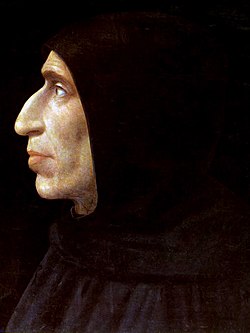Girolamo Savonarola Quote
Related Quotes
Some of the most evil human beings in the world are psychiatrists. Not all psychiatrists. Some psychiatrists are selfless, caring people who really want to help. But the sad truth is that in today's s...
Rebecca McNutt
Tags:
asocial, child innocence, childhood, colleague, creepy, crime, disorder, drug company, drugs, ethics
For the most part, people strenuously resist any redefinition of morality, because it shakes them to the very core of their being to think that in pursuing virtue they may have been feeding vice, or i...
Stefan Molyneux
Tags:
anarchy, ancap, belief, brainwashing, coercion, critical thinking, dangerous, education, ethics, evidence
Christians sometimes make themselves into elephants afraid of mice. You have the Creator of the universe on your side; not to mention, you've been given eternal life. 'Whom or what shall you fear?' To...
Criss Jami
Tags:
anxiety, apologetics, bravery, christ, christ jesus, christian, christianity, courage, darkness, death
About Girolamo Savonarola
Girolamo Savonarola, OP (UK: , US: ; Italian: [dʒiˈrɔːlamo savonaˈrɔːla]; 21 September 1452 – 23 May 1498), also referred to as Jerome Savonarola, was an ascetic Dominican friar from Ferrara and a preacher active in Renaissance Florence. He became known for his prophecies of civic glory, his advocacy of the destruction of secular art and culture, and his calls for Christian renewal. He denounced clerical corruption, despotic rule, and the exploitation of the poor.
In September 1494, when King Charles VIII of France invaded Italy and threatened Florence, Savonarola's prophecies seemed on the verge of fulfillment. While the friar intervened with the French king, the Florentines expelled the ruling Medicis and at Savonarola's urging established a "well received" republic, effectively under Savonarola's control. Declaring that Florence would be the New Jerusalem, the world centre of Christianity and "richer, more powerful, more glorious than ever", he instituted an extreme moralistic campaign, enlisting the active help of Florentine youth.
In 1495, when Florence refused to join Pope Alexander VI's Holy League against the French, the Vatican summoned Savonarola to Rome. He disobeyed, and further defied the pope by preaching under a ban, highlighting his campaign for reform with processions, bonfires of the vanities, and pious theatricals. In retaliation, Pope Alexander excommunicated Savonarola in May 1497 and threatened to place Florence under an interdict. A trial by fire proposed by a rival Florentine preacher in April 1498 to test Savonarola's divine mandate turned into a fiasco, and popular opinion turned against him. Savonarola and two of his supporting friars were imprisoned. On 23 May 1498, Church and civil authorities condemned, hanged, and burned the bodies of the three friars in the main square of Florence.
Savonarola's devotees, the Piagnoni, kept his cause of republican freedom and religious reform alive well into the following century. Pope Julius II (in office: 1503–1513) allegedly considered his canonization. The Medici—restored to power in Florence in 1512 with the help of the papacy—eventually weakened the Piagnoni movement. Some early Protestants, including Martin Luther himself, have regarded Savonarola as a vital precursor to the Protestant Reformation.
In September 1494, when King Charles VIII of France invaded Italy and threatened Florence, Savonarola's prophecies seemed on the verge of fulfillment. While the friar intervened with the French king, the Florentines expelled the ruling Medicis and at Savonarola's urging established a "well received" republic, effectively under Savonarola's control. Declaring that Florence would be the New Jerusalem, the world centre of Christianity and "richer, more powerful, more glorious than ever", he instituted an extreme moralistic campaign, enlisting the active help of Florentine youth.
In 1495, when Florence refused to join Pope Alexander VI's Holy League against the French, the Vatican summoned Savonarola to Rome. He disobeyed, and further defied the pope by preaching under a ban, highlighting his campaign for reform with processions, bonfires of the vanities, and pious theatricals. In retaliation, Pope Alexander excommunicated Savonarola in May 1497 and threatened to place Florence under an interdict. A trial by fire proposed by a rival Florentine preacher in April 1498 to test Savonarola's divine mandate turned into a fiasco, and popular opinion turned against him. Savonarola and two of his supporting friars were imprisoned. On 23 May 1498, Church and civil authorities condemned, hanged, and burned the bodies of the three friars in the main square of Florence.
Savonarola's devotees, the Piagnoni, kept his cause of republican freedom and religious reform alive well into the following century. Pope Julius II (in office: 1503–1513) allegedly considered his canonization. The Medici—restored to power in Florence in 1512 with the help of the papacy—eventually weakened the Piagnoni movement. Some early Protestants, including Martin Luther himself, have regarded Savonarola as a vital precursor to the Protestant Reformation.
